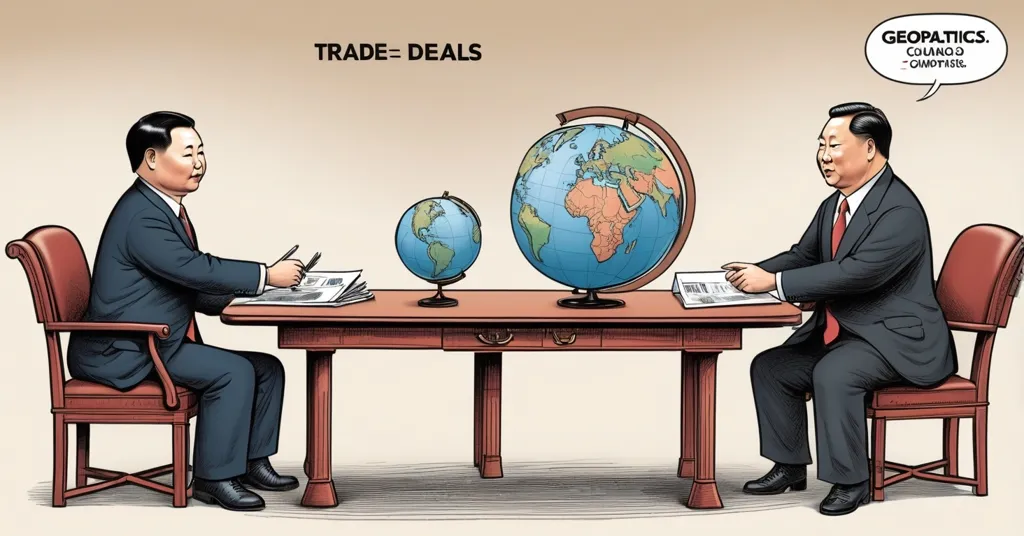Trump Highlights U.S.-China Communication Gap: Trade vs. Geopolitical Focus

Trump Reveals Communication Gap in U.S.-China Relations: Trade vs. Geopolitics
Former President Donald Trump has highlighted a significant communication gap between U.S. and Chinese officials, pointing out that while U.S. officials are focused on trade deals and economic agreements, Chinese officials are more concerned with broader strategic and geopolitical issues. This discrepancy could complicate future negotiations and underscores the complexities of international diplomacy.
- U.S. officials prioritize trade deals and economic agreements.
- Chinese officials focus on strategic and geopolitical issues.
- This communication gap poses challenges for U.S.-China relations.
Trump’s recent comments shed light on a critical issue in U.S.-China relations. “U.S. officials are focused on trade deals and economic agreements, while Chinese officials are more concerned with broader strategic and geopolitical issues,” he remarked. This insight from Trump, who initiated a trade war with China during his presidency, highlights ongoing challenges in aligning the objectives of both nations.
U.S. Priorities
The U.S. has traditionally centered its approach on economic agreements, aiming to address trade imbalances and protect domestic industries. It’s like trying to fix a leaky faucet while ignoring the flood in the basement. The U.S. sees trade as a key tool for diplomacy, but this focus might miss the bigger picture of global influence and strategic considerations. The comments by Donald Trump on these negotiations further emphasize the U.S. perspective.
China’s Geopolitical Focus
In contrast, China’s emphasis on strategic and geopolitical issues reflects its long-term strategy to expand its global influence. Initiatives like the Belt and Road—a global initiative by China to enhance its economic and geopolitical influence through infrastructure projects—often clash with U.S. interests, fueling geopolitical tensions. It’s like trying to play chess while the other side is playing a different game altogether. This focus is part of a broader analysis of U.S. focus on trade deals versus China’s geopolitical strategy.
The Trade War
The trade war initiated by Trump in 2018 marked a pivotal moment in U.S.-China relations, with the U.S. imposing tariffs on Chinese goods and China retaliating. This economic conflict highlighted the U.S.’s focus on trade as a tool for diplomacy, while China’s response indicated its broader strategic considerations. Despite shifts in U.S. policy under the Biden administration, which now also emphasizes human rights and security concerns, the communication gap identified by Trump persists. The broader implications of these policies are discussed in long-term effects of Trump’s trade policies on U.S.-China relations.
Implications for Global Diplomacy
This discrepancy in focus between economic and strategic priorities can lead to misunderstandings and misaligned expectations, complicating negotiations and potentially escalating tensions. It affects not only bilateral relations but also has broader implications for the global economy, creating uncertainty that can influence international trade and investment decisions. It’s like trying to talk about the weather while the other person is discussing the meaning of life. The impact of this communication gap on global diplomacy is further explored in discussions on platforms like Quora.
The challenge for international diplomacy lies in finding common ground between these differing objectives. Effective negotiation requires a nuanced approach, where both sides must be willing to compromise and understand each other’s priorities to achieve meaningful progress. As U.S.-China relations continue to evolve, navigating this communication gap will be crucial for future diplomatic efforts. The ongoing discussions and recent developments in U.S.-China relations and communication gaps are critical to watch.
Key Takeaways and Questions
- What are the main focuses of U.S. and Chinese officials in their discussions?
U.S. officials primarily focus on trade deals and economic agreements, aiming to address trade imbalances and protect domestic industries. Chinese officials, on the other hand, prioritize broader strategic and geopolitical issues, such as expanding their global influence and securing strategic assets.
- How does the discrepancy in focus affect U.S.-China relations?
The discrepancy leads to misunderstandings and misaligned expectations, complicating negotiations and potentially escalating tensions. It can hinder progress on trade agreements and exacerbate geopolitical rivalries.
- What challenges does this communication gap pose for international diplomacy?
The communication gap challenges diplomats to find common ground between economic and strategic objectives. It requires a nuanced approach to negotiations, where both sides must be willing to compromise and understand each other’s priorities to achieve meaningful progress.
In the world of cryptocurrencies, understanding global economic dynamics is crucial. While the U.S. and China navigate their complex relationship, the crypto community watches closely, knowing that these discussions could impact the global financial landscape and, by extension, the adoption and regulation of digital currencies like Bitcoin. The broader context of these discussions is often debated in forums like Reddit, where the interplay between economic agreements and geopolitical strategy is analyzed in depth.



